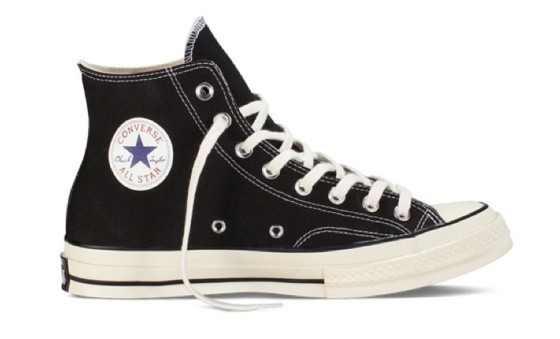
Westminster-based e-commere retailer Orange Clubwear announced Monday it will vigorously defend itself against trademark infringement litigation brought by Converse, which accuses several companies of copying the iconic Chuck Taylor sneaker.
]
Orange Clubwear and another relatively small company, Nowhere Co. Ltd., have been lumped in with Wal-Mart Stores Inc., H&M Hennes & Mauritz LP, K-Mart Corp. and Skechers U.S.A. Inc. among many others in Converse's trademark and trade dress rights infringement complaint filed in the U.S. District Court for the Eastern District of New York and with the International Trademark Commission.
But Orange Clubwear in a statement accuses Converse of mistakenly claiming the Orange County company made, imported and did business under the name of “Demonia Deviant.” Orange Clubwear does advertise on its website a brand known only as Demonia.
“Alternative, defiant, and nonconforming enthusiasts need look no further than DEMONIA for the most cutting-edge, beyond-the-ordinary line of footwear,” reads the ad copy that is next to pages of photos of nightclub shoes for men and women that, at least as near as I can tell, look nothing like Chucks, although Converse is pointing to what's inside targeted shoes.
“This is an outrageous situation in which Converse is wrongly going after an innocent small company,” Orange Clubwear says in the statement. “These allegations are entirely false. Orange Clubwear has never operated under the name 'Demonia Deviant,' nor has it ever manufactured 'Demonia Deviant' footwear or imported such footwear into the United States. Rather, Orange Clubwear has procured footwear and other apparel for resale solely from U.S.-based wholesalers.”
The OC company retained the New York law firm of Barton LLP to defend its interests in the New York District Court and ITC proceedings, but when Barton tried to inform Converse of the supposed mistaken identity, the sneaker giant responded by pointing to yet another party's website it accused of infringement that Orange Clubwear swears it is not associated with, Barton and its client claim.
“Converse has refused to acknowledge that it was a mistake to name Orange Clubwear as a party to these proceedings, notwithstanding that Orange Clubwear's sales of allegedly infringing footwear were as a reseller and in a trivial amount, generating less than $300 in profit,” the local company insists. “Instead, Converse continues to press its claims against Orange Clubwear.”
The company says it is therefore forced to join the costly defense being mounted by the better-heeled Skechers, Walmart, K-Mart and the rest. “Orange Clubwear has had to borrow funds from a bank to cover its legal fees and expenses, and it has suspended payment of salaries to its three operating partners,” the company claims.
[

“Notwithstanding these hardships, Orange Clubwear has determined to mount an aggressive defense to the claims made against it by Converse, asserting that Converse failed to conduct an adequate investigation before wrongly naming Orange Clubwear as a party,” the company asserts.
“Instead of acknowledging its obvious mistake, Converse continues to pursue claims against Orange Clubwear and refuses Orange Clubwear's demand that it be compensated for Converse's mistake,” Barton partner Maurice Ross says in the statement.
When Converse first brought the suit, Orange Clubwear publicly wondered about the timing, noting that Chuck Taylor shoes have been around since 1917, Orange Clubwear entered the market in 2000 but the legal action was only filed in October.
In the complaint, Converse points to three protected Chuck elements that the shoemaker has had registered at the trademark office since 2011: a rubber “bumper” running around the front of the shoe, a “toe cap” on the top of the shoe above the bumper, and lines or stripes running around the sides. Converse explains it hadn't sued for a long time because infringements were relatively rare until they spiked in 2008.
“It is disgraceful that a giant corporation like Converse refuses to acknowledge its mistake and instead, is pursuing claims against a small mom-and-pop company that has always acted legally,” Ross says. “Converse surely knows that the legal costs and expenses required to defend against those claims could put a small company such as Orange Clubwear out of business.”
Email: mc****@oc******.com. Twitter: @MatthewTCoker. Follow OC Weekly on Twitter @ocweekly or on Facebook!

OC Weekly Editor-in-Chief Matt Coker has been engaging, enraging and entertaining readers of newspapers, magazines and websites for decades. He spent the first 13 years of his career in journalism at daily newspapers before “graduating” to OC Weekly in 1995 as the alternative newsweekly’s first calendar editor.

